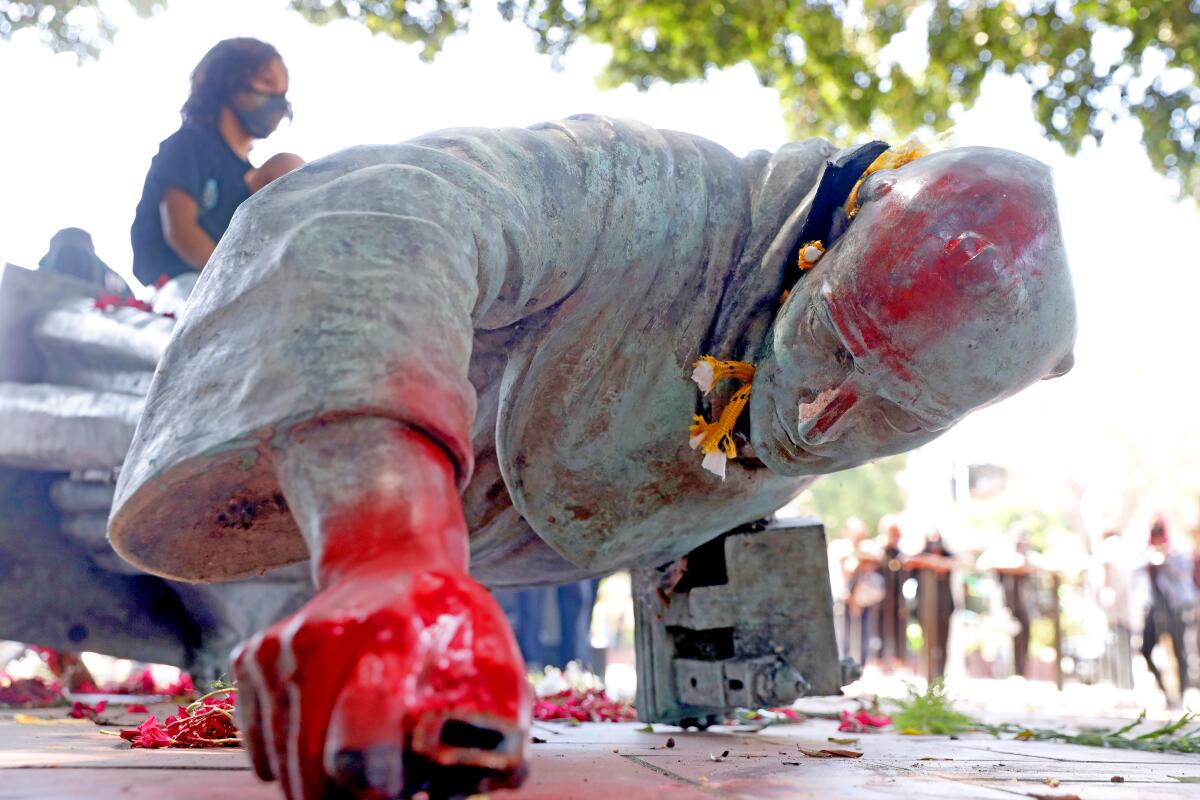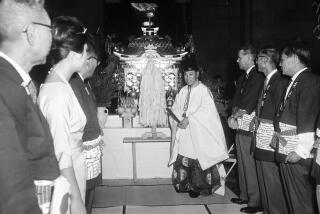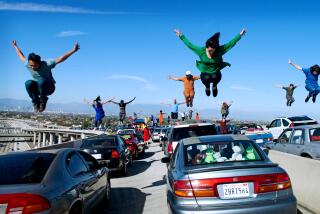Los Angeles wants future monuments and memorials to more accurately reflect its history

A memorial to the victims of an anti-Chinese massacre in the 1800s. A tribute to the front-line workers in the COVID-19 pandemic. The appointment of an official city historian.
These are among the recommendations announced last week by a group impaneled by Los Angeles Mayor Eric Garcetti’s office to help develop ways to more accurately reflect the triumphs as well as the darker moments in the city’s history.
“This is much more than about building memorials,” Garcetti said during a virtual news conference. “It’s about understanding memory.”
The city should complete an audit of monuments on publicly accessible land and develop strategies to recontextualize or remove those that are outdated or fraught, the Civic Memory Working Group recommended in its 166-page report.
That comes amid a national reckoning over the choice of which historical figuresto honor, the renaming of some streets and buildings, and the removal of certain monuments by governments and activists alike. In 2020, 167 Confederate symbols were removed across the U.S., including three in California, according to the Southern Poverty Law Center.
“Our recommendations … flow from the recognition that so many monuments are coming down around the country for a reason, and that they represent visions of empire, state violence and white supremacy that just simply cannot hold,” said Rosten Woo, an artist and designer who co-chaired a subcommittee within the group. “And that’s a good thing.”
Over the last year, protesters in San Francisco and downtown Los Angeles have toppled statues of Father Junípero Serra, who served as principal architect of the California mission system during the era of Spanish colonization. The working group dedicated a roundtable to discussing Serra’s controversial legacy.
The city should reconfigure programs aimed at creating public monuments, naming public places and designating historic sites to be more transparent and participatory, and provide resources to communities to develop projects that are meaningful to them, Woo said.
“We heard again and again from our partners in this effort that the city has acted as a gatekeeper in terms of civic memory and might better think of its role as a facilitator to allow and support expressions of civic memory in many forms across the city,” said Christopher Hawthorne, the city’s chief design officer, who coordinated the working group’s efforts.
The group, which formed in November 2019, recommended the city build a memorial to mark the 150th anniversary of the 1871 anti-Chinese massacre, in which a mob murdered 10% of the city’s Chinese population, as well as a garden dedicated to Los Angeles’ essential workers who risked their lives during the COVID-19 pandemic. The group said the city should also solicit ideas to commemorate the 30th anniversary of the 1992 civil unrest that followed the Rodney King beating trial.
L.A. has a long history of anti-Asian sentiment. In 1871, a mob attacked Chinese people, killing 19, including a 14-year-old boy and a physician.
“It’s not just about correcting the historical record, in my mind,” said working group member Gail Kennard, who manages an architecture firm and is vice president of the Los Angeles Cultural Heritage Commission. “It’s also about changing our culture and how we value each other.”
Other key recommendations include working with the Los Angeles City/County Native American Indian Commission to adopt an Indigenous Land Acknowledgement Policy, creating a city historian position and exploring the creation of a museum of the city of Los Angeles.
“The recognition of local tribes, their histories and their contemporary realities is long overdue,” Alexandra Valdes, executive director of the commission, said in a statement. “The commission looks forward to supporting the city and county’s land acknowledgement efforts and is hopeful that the increased awareness of local tribal communities will result in increased resources, support and investment, and land return.”
The working group has recommended the city present the report to a range of communities in a series of discussions and listening sessions to get feedback and help transform the recommendations into policy.
“It’s wonderful to bring the past into dialogues about our present so we can collectively work toward a better future,” said William Deverell, director of the Huntington-USC Institute on California and the West, which produced the report with support from the Getty Foundation.
More to Read
Sign up for Essential California
The most important California stories and recommendations in your inbox every morning.
You may occasionally receive promotional content from the Los Angeles Times.











